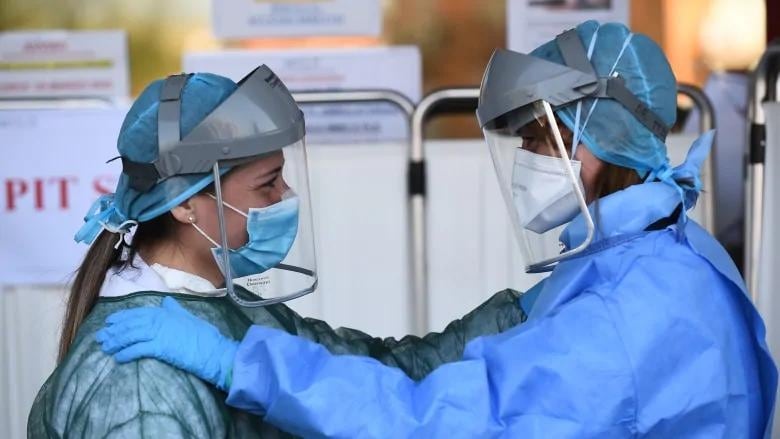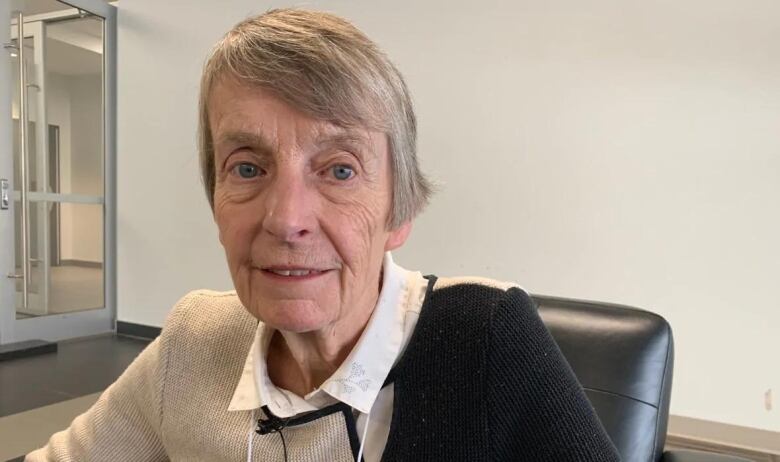University of Alberta study examines COVID-19 toll on health-care workers
Study hopes to find ways to reduce exposure risk and mental health stress, researcher says

An ongoing study at the University of Alberta is looking into the toll the COVID-19 pandemic is taking on health-care workers across Canada, examiningtheir mental healthand exposure to the virus.
The three-phase study has enrolled 5,000 health-care workers in Alberta, British Columbia, Ontario and Quebec. Participants include physicians in all four provinces, personal support workers in Ontario along with nurses and health-care aides in Alberta.
About 4,000participantsare based in Alberta.
"The study has two goals," said lead researcher Dr. Nicola Cherry, an occupational epidemiologistat the University of Alberta.
Cherry says the team will first try to find out how many health-care workers have antibodies to the virus that causes COVID-19, which suggests aprevious infection.
"Our aim is to identify work practices and exposures that could be improved and made safer," she said.
"Second, we want to examine health-care workers and the state of their mental health with the goal to identify workplace practices and supports that could be improved to reduce stress."
The recruitment stage, Phase 1,started in Alberta at the beginning of the pandemic and eventuallyextended to Ontario, British Columbia and Quebec. Phase 2is now underway and involves the collection of blood samples, as well as looking at who's taking advantage of mental health supports.
According to Cherry, it's critical to understand the dangers COVID-19 presents to health-care workers. She saysif they are affected by the virus, the entire health-care system is at risk.
"If a health-care worker is sick and not able to go to work, or goes to work and works less well than they would normally, that's going to very much affect all of us in the community," Cherry said.
"If we get sick and the support isn't there, we're going to have a much higher mortality rate."

Preliminary, non-peer reviewed results suggest that of those who have been tested, rates of infection were higher in physicians than in other health-care workers and higher in Quebec physicians than among physicians in Alberta.
Although the numberof people testing in Alberta during Phase 1was low, results in Phase 2now suggest three times more health-care workers in Alberta have tested positive for COVID-19than at the beginning of the pandemic.
"If we look at the health-care workers in Alberta as a whole, if we look at those working for Alberta Health, and Covenant Health, it's about 1,500," Cherry estimated.
High levels of anxiety, concern for long-term health
Initial data also suggests high levels of anxiety in all groups, with the highest numbers among physicians.
"More than half the doctors now have these very high levels of anxiety that give us concern about how they're going to cope long term," Cherry said.
The study has also found the majority of health-care workers have access to some kind of mental-health support, and those who take advantage of it are less anxious than those who don't.
More than half the doctors now have these very high levels of anxiety that give us concern about how they're going to cope long term.- Dr. Nicola Cherry, occupational epidemiologist at the U of A
According to researchers, a bright spot in the study has involved the use of personal protective equipment (PPE), which Cherry says has been effective in keeping rates of infection lower in the provincecompared toother parts of the world.
"In Alberta, very few of the physicians and nurses are reporting difficulty getting PPE," Cherry said.
"Those who are LPNs and health-care aides report more difficulty. But actually those who are central to the fight against COVID in the hospitals do seem to be getting the PPE they need."
Phase 3of the study will begin sometime next year, depending on a vaccine, when researchers will follow up with all respondents about their test results and experiencesworking in hospitals since the beginning of the pandemic.
"We'll be able to see how working for a whole year or more with COVID has affected their overall health," Cherry said.












_(720p).jpg)


 OFFICIAL HD MUSIC VIDEO.jpg)
.jpg)



























































































